ICT Project Management: Methodologies and Project Life Cycle
VerifiedAdded on 2021/12/22
|8
|1053
|48
Report
AI Summary
This report provides a comprehensive overview of ICT project management, focusing on the definition and role of methodologies. It delves into a detailed comparison and contrast between the PRINCE2 and Waterfall methodologies, highlighting their similarities and differences in approach and application. The report further explores the project life cycle, specifically identifying the stages within both PRINCE2 and Waterfall methodologies, offering a structured understanding of how projects are initiated, planned, executed, and closed. The analysis includes references to key project management concepts and frameworks, making it a valuable resource for students studying project management principles and practices. The report is designed to provide a clear understanding of each methodology and its practical application.
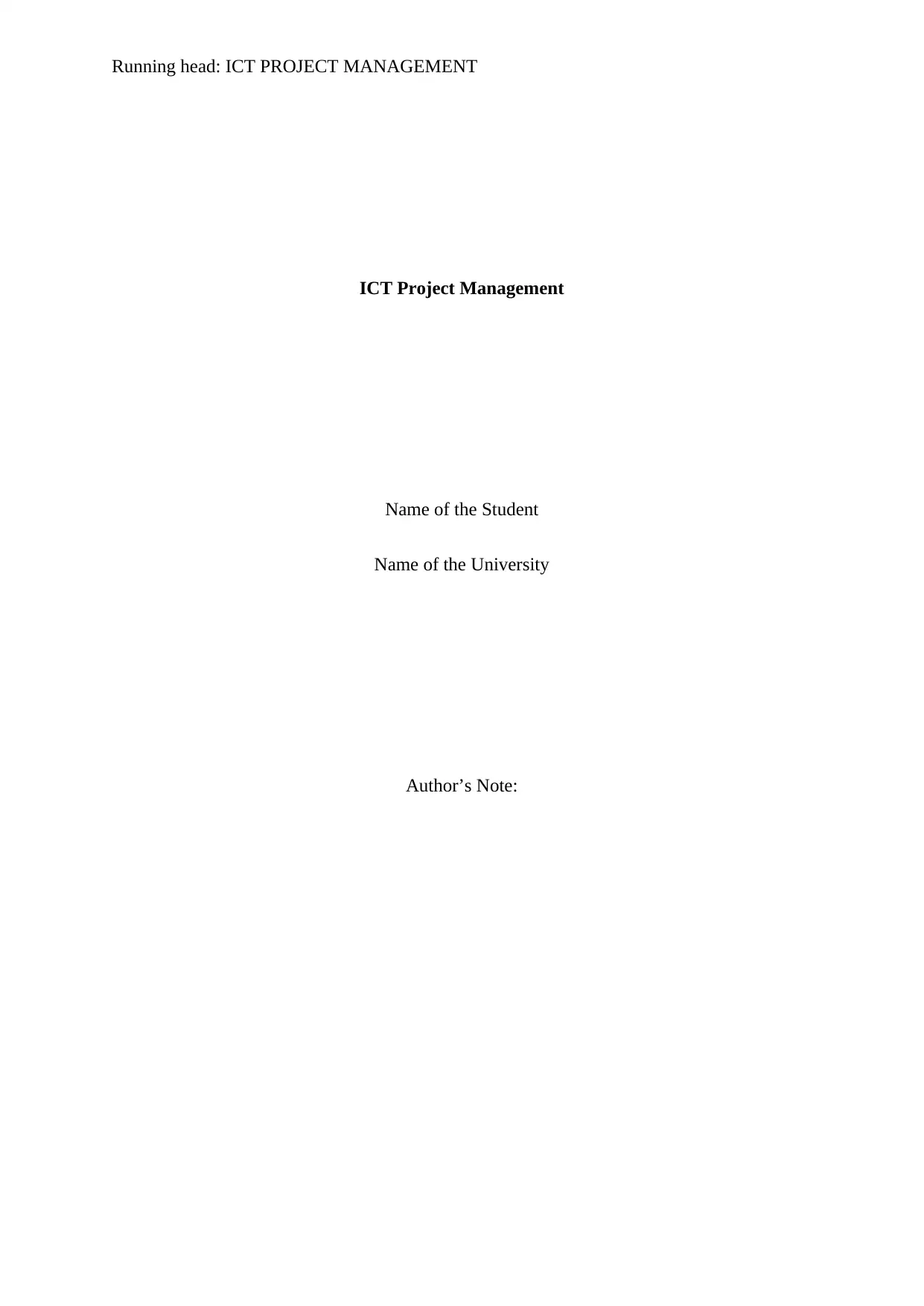
Running head: ICT PROJECT MANAGEMENT
ICT Project Management
Name of the Student
Name of the University
Author’s Note:
ICT Project Management
Name of the Student
Name of the University
Author’s Note:
Paraphrase This Document
Need a fresh take? Get an instant paraphrase of this document with our AI Paraphraser

1
ICT PROJECT MANAGEMENT
Table of Contents
Question 1..................................................................................................................................2
Question 2..................................................................................................................................3
Question 3..................................................................................................................................5
References..................................................................................................................................6
ICT PROJECT MANAGEMENT
Table of Contents
Question 1..................................................................................................................................2
Question 2..................................................................................................................................3
Question 3..................................................................................................................................5
References..................................................................................................................................6
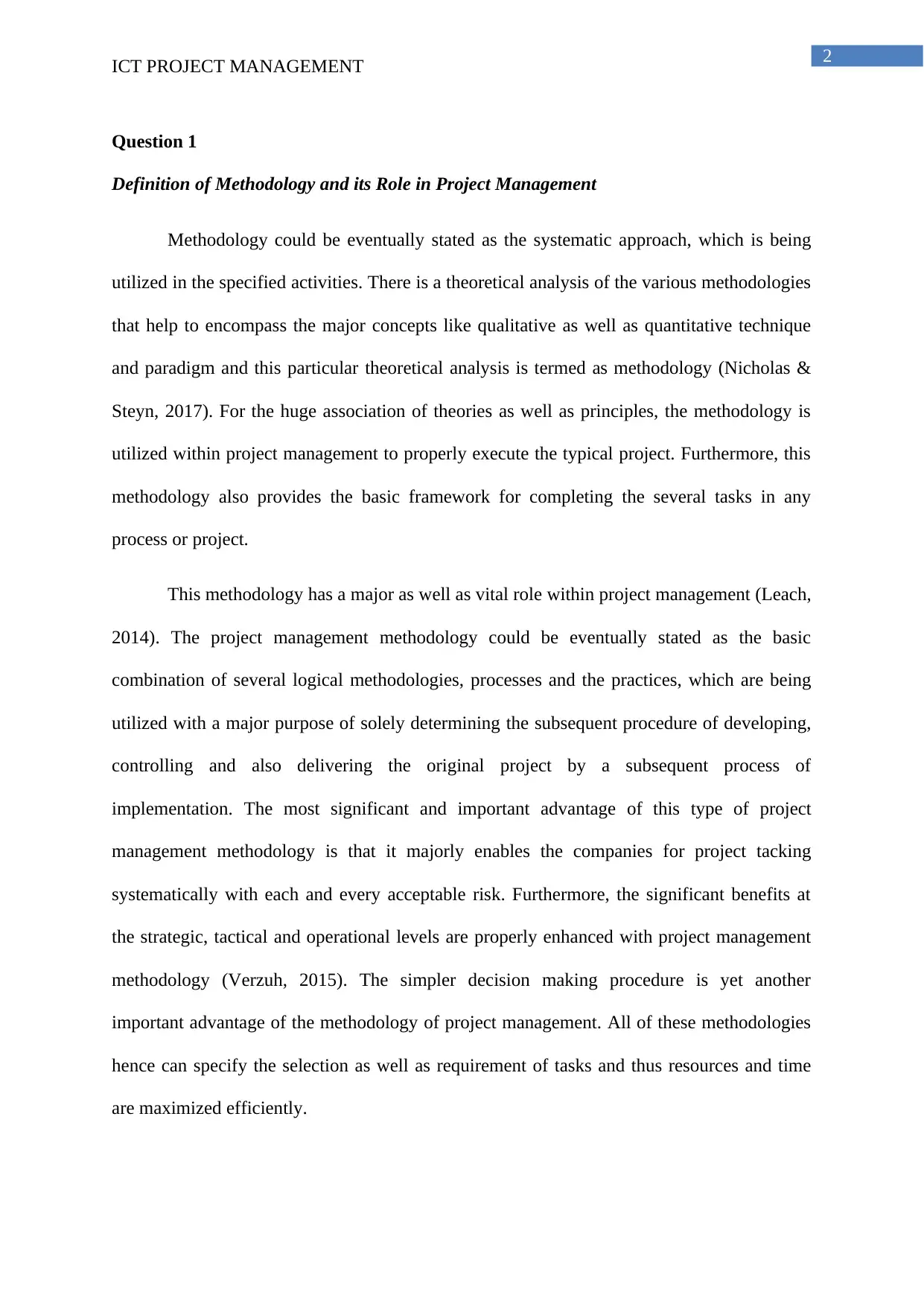
2
ICT PROJECT MANAGEMENT
Question 1
Definition of Methodology and its Role in Project Management
Methodology could be eventually stated as the systematic approach, which is being
utilized in the specified activities. There is a theoretical analysis of the various methodologies
that help to encompass the major concepts like qualitative as well as quantitative technique
and paradigm and this particular theoretical analysis is termed as methodology (Nicholas &
Steyn, 2017). For the huge association of theories as well as principles, the methodology is
utilized within project management to properly execute the typical project. Furthermore, this
methodology also provides the basic framework for completing the several tasks in any
process or project.
This methodology has a major as well as vital role within project management (Leach,
2014). The project management methodology could be eventually stated as the basic
combination of several logical methodologies, processes and the practices, which are being
utilized with a major purpose of solely determining the subsequent procedure of developing,
controlling and also delivering the original project by a subsequent process of
implementation. The most significant and important advantage of this type of project
management methodology is that it majorly enables the companies for project tacking
systematically with each and every acceptable risk. Furthermore, the significant benefits at
the strategic, tactical and operational levels are properly enhanced with project management
methodology (Verzuh, 2015). The simpler decision making procedure is yet another
important advantage of the methodology of project management. All of these methodologies
hence can specify the selection as well as requirement of tasks and thus resources and time
are maximized efficiently.
ICT PROJECT MANAGEMENT
Question 1
Definition of Methodology and its Role in Project Management
Methodology could be eventually stated as the systematic approach, which is being
utilized in the specified activities. There is a theoretical analysis of the various methodologies
that help to encompass the major concepts like qualitative as well as quantitative technique
and paradigm and this particular theoretical analysis is termed as methodology (Nicholas &
Steyn, 2017). For the huge association of theories as well as principles, the methodology is
utilized within project management to properly execute the typical project. Furthermore, this
methodology also provides the basic framework for completing the several tasks in any
process or project.
This methodology has a major as well as vital role within project management (Leach,
2014). The project management methodology could be eventually stated as the basic
combination of several logical methodologies, processes and the practices, which are being
utilized with a major purpose of solely determining the subsequent procedure of developing,
controlling and also delivering the original project by a subsequent process of
implementation. The most significant and important advantage of this type of project
management methodology is that it majorly enables the companies for project tacking
systematically with each and every acceptable risk. Furthermore, the significant benefits at
the strategic, tactical and operational levels are properly enhanced with project management
methodology (Verzuh, 2015). The simpler decision making procedure is yet another
important advantage of the methodology of project management. All of these methodologies
hence can specify the selection as well as requirement of tasks and thus resources and time
are maximized efficiently.
⊘ This is a preview!⊘
Do you want full access?
Subscribe today to unlock all pages.

Trusted by 1+ million students worldwide
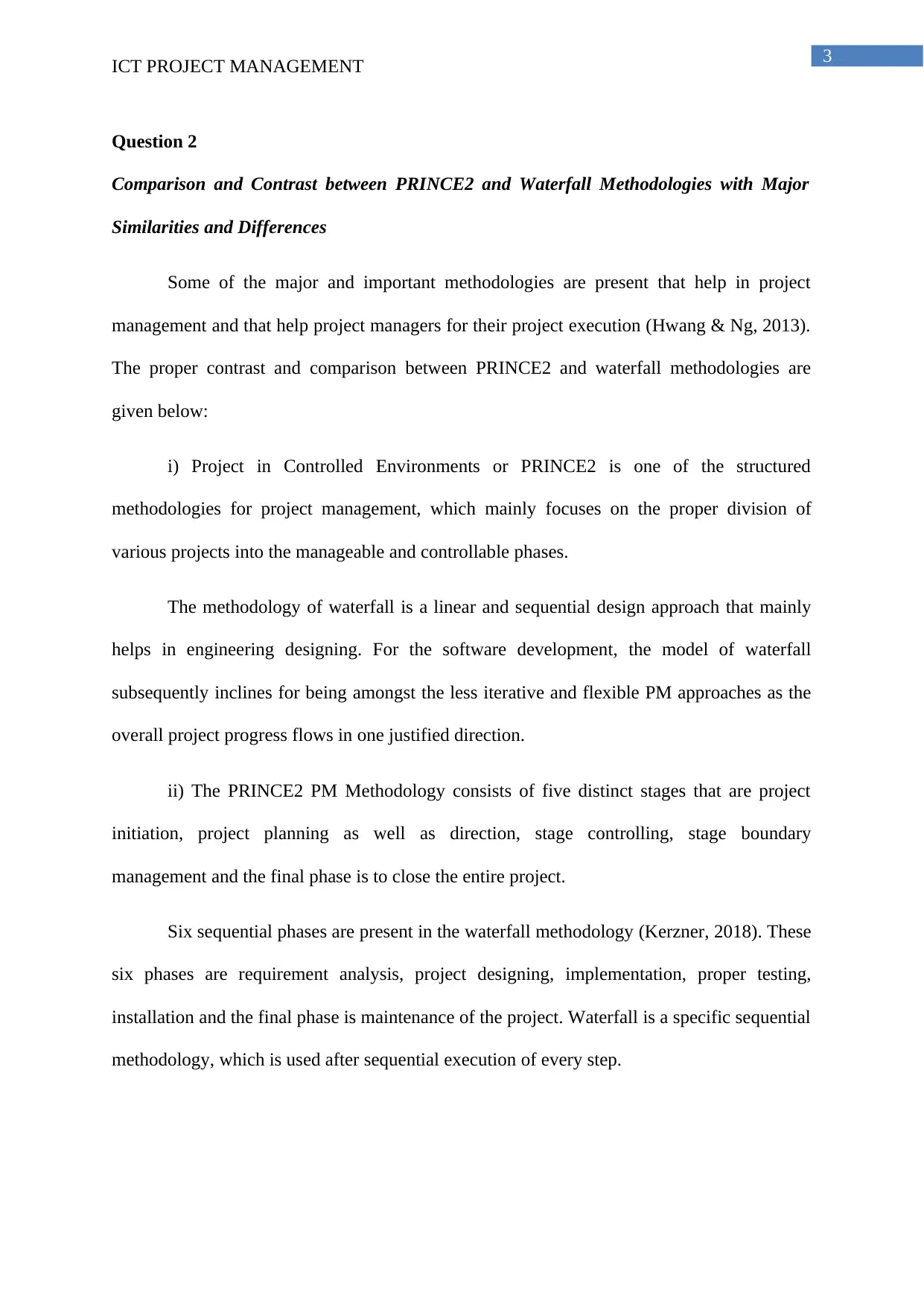
3
ICT PROJECT MANAGEMENT
Question 2
Comparison and Contrast between PRINCE2 and Waterfall Methodologies with Major
Similarities and Differences
Some of the major and important methodologies are present that help in project
management and that help project managers for their project execution (Hwang & Ng, 2013).
The proper contrast and comparison between PRINCE2 and waterfall methodologies are
given below:
i) Project in Controlled Environments or PRINCE2 is one of the structured
methodologies for project management, which mainly focuses on the proper division of
various projects into the manageable and controllable phases.
The methodology of waterfall is a linear and sequential design approach that mainly
helps in engineering designing. For the software development, the model of waterfall
subsequently inclines for being amongst the less iterative and flexible PM approaches as the
overall project progress flows in one justified direction.
ii) The PRINCE2 PM Methodology consists of five distinct stages that are project
initiation, project planning as well as direction, stage controlling, stage boundary
management and the final phase is to close the entire project.
Six sequential phases are present in the waterfall methodology (Kerzner, 2018). These
six phases are requirement analysis, project designing, implementation, proper testing,
installation and the final phase is maintenance of the project. Waterfall is a specific sequential
methodology, which is used after sequential execution of every step.
ICT PROJECT MANAGEMENT
Question 2
Comparison and Contrast between PRINCE2 and Waterfall Methodologies with Major
Similarities and Differences
Some of the major and important methodologies are present that help in project
management and that help project managers for their project execution (Hwang & Ng, 2013).
The proper contrast and comparison between PRINCE2 and waterfall methodologies are
given below:
i) Project in Controlled Environments or PRINCE2 is one of the structured
methodologies for project management, which mainly focuses on the proper division of
various projects into the manageable and controllable phases.
The methodology of waterfall is a linear and sequential design approach that mainly
helps in engineering designing. For the software development, the model of waterfall
subsequently inclines for being amongst the less iterative and flexible PM approaches as the
overall project progress flows in one justified direction.
ii) The PRINCE2 PM Methodology consists of five distinct stages that are project
initiation, project planning as well as direction, stage controlling, stage boundary
management and the final phase is to close the entire project.
Six sequential phases are present in the waterfall methodology (Kerzner, 2018). These
six phases are requirement analysis, project designing, implementation, proper testing,
installation and the final phase is maintenance of the project. Waterfall is a specific sequential
methodology, which is used after sequential execution of every step.
Paraphrase This Document
Need a fresh take? Get an instant paraphrase of this document with our AI Paraphraser

4
ICT PROJECT MANAGEMENT
iii) The methodology of PRINCE2 is one of the structured approach that is eventually
completed after properly executing every particular step. A basic framework as well as some
of the guidelines are eventually followed here.
The waterfall methodology is similar to PRINCE2 in this particular factor. This is the
structured approach that subsequently follows a specified structure or framework for proper
completion of project.
ICT PROJECT MANAGEMENT
iii) The methodology of PRINCE2 is one of the structured approach that is eventually
completed after properly executing every particular step. A basic framework as well as some
of the guidelines are eventually followed here.
The waterfall methodology is similar to PRINCE2 in this particular factor. This is the
structured approach that subsequently follows a specified structure or framework for proper
completion of project.
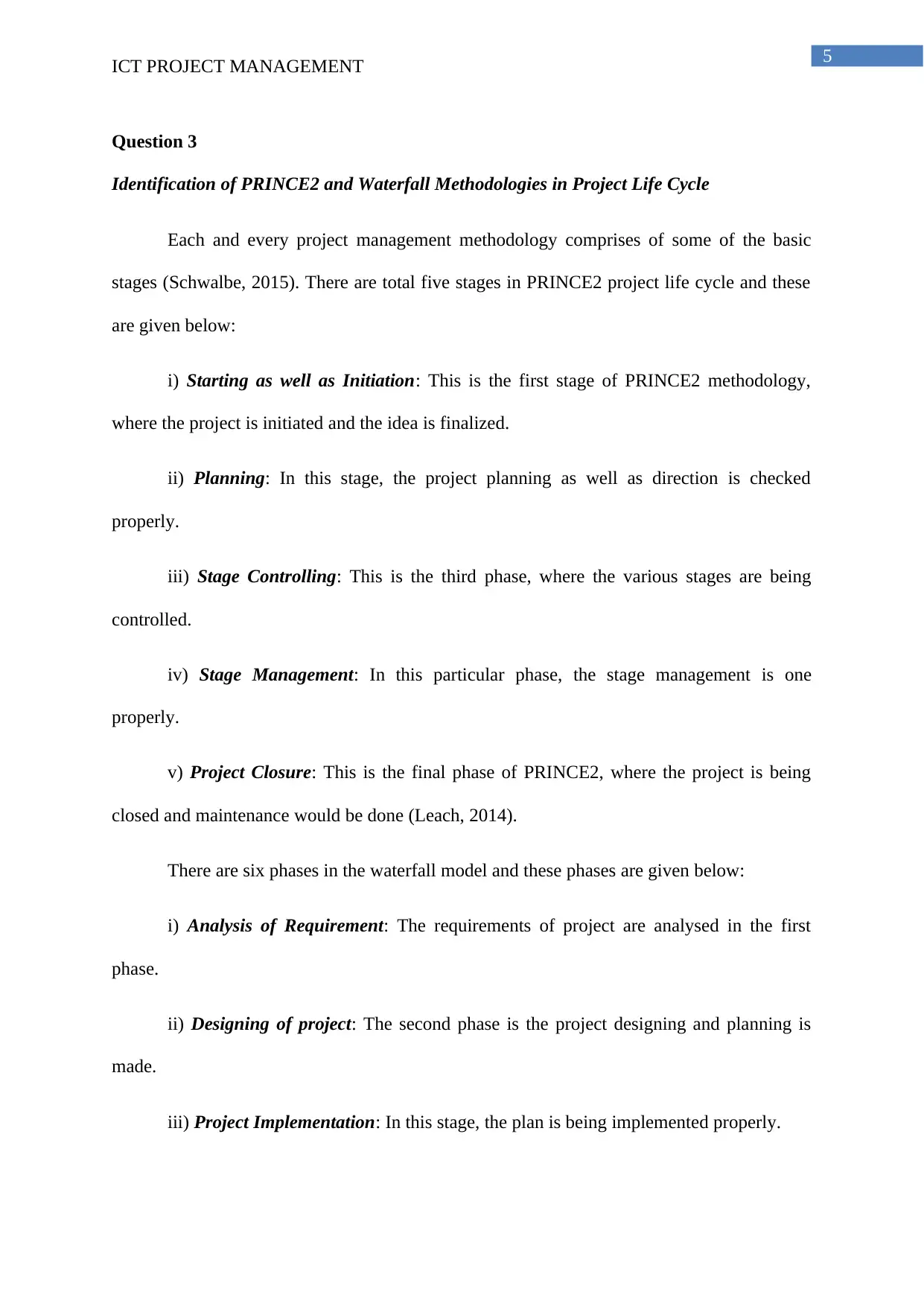
5
ICT PROJECT MANAGEMENT
Question 3
Identification of PRINCE2 and Waterfall Methodologies in Project Life Cycle
Each and every project management methodology comprises of some of the basic
stages (Schwalbe, 2015). There are total five stages in PRINCE2 project life cycle and these
are given below:
i) Starting as well as Initiation: This is the first stage of PRINCE2 methodology,
where the project is initiated and the idea is finalized.
ii) Planning: In this stage, the project planning as well as direction is checked
properly.
iii) Stage Controlling: This is the third phase, where the various stages are being
controlled.
iv) Stage Management: In this particular phase, the stage management is one
properly.
v) Project Closure: This is the final phase of PRINCE2, where the project is being
closed and maintenance would be done (Leach, 2014).
There are six phases in the waterfall model and these phases are given below:
i) Analysis of Requirement: The requirements of project are analysed in the first
phase.
ii) Designing of project: The second phase is the project designing and planning is
made.
iii) Project Implementation: In this stage, the plan is being implemented properly.
ICT PROJECT MANAGEMENT
Question 3
Identification of PRINCE2 and Waterfall Methodologies in Project Life Cycle
Each and every project management methodology comprises of some of the basic
stages (Schwalbe, 2015). There are total five stages in PRINCE2 project life cycle and these
are given below:
i) Starting as well as Initiation: This is the first stage of PRINCE2 methodology,
where the project is initiated and the idea is finalized.
ii) Planning: In this stage, the project planning as well as direction is checked
properly.
iii) Stage Controlling: This is the third phase, where the various stages are being
controlled.
iv) Stage Management: In this particular phase, the stage management is one
properly.
v) Project Closure: This is the final phase of PRINCE2, where the project is being
closed and maintenance would be done (Leach, 2014).
There are six phases in the waterfall model and these phases are given below:
i) Analysis of Requirement: The requirements of project are analysed in the first
phase.
ii) Designing of project: The second phase is the project designing and planning is
made.
iii) Project Implementation: In this stage, the plan is being implemented properly.
⊘ This is a preview!⊘
Do you want full access?
Subscribe today to unlock all pages.

Trusted by 1+ million students worldwide

6
ICT PROJECT MANAGEMENT
iv) Testing: In the fourth stage, defect debugging is done and then testing is
completed.
v) Project Installation: Here, the software is installed properly (Kerzner, 2018).
vi) Maintenance: In the final phase, project maintenance is done.
ICT PROJECT MANAGEMENT
iv) Testing: In the fourth stage, defect debugging is done and then testing is
completed.
v) Project Installation: Here, the software is installed properly (Kerzner, 2018).
vi) Maintenance: In the final phase, project maintenance is done.
Paraphrase This Document
Need a fresh take? Get an instant paraphrase of this document with our AI Paraphraser
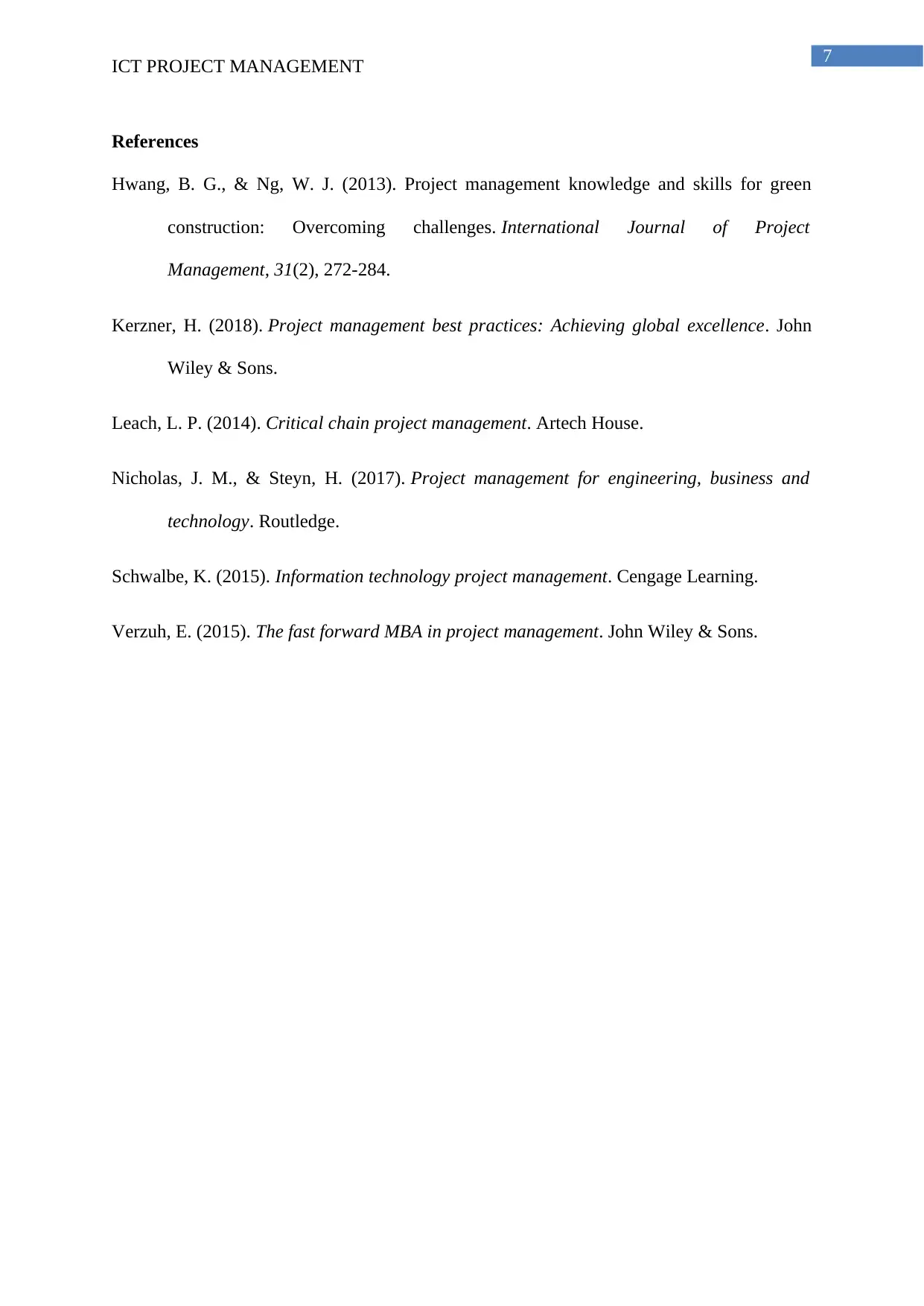
7
ICT PROJECT MANAGEMENT
References
Hwang, B. G., & Ng, W. J. (2013). Project management knowledge and skills for green
construction: Overcoming challenges. International Journal of Project
Management, 31(2), 272-284.
Kerzner, H. (2018). Project management best practices: Achieving global excellence. John
Wiley & Sons.
Leach, L. P. (2014). Critical chain project management. Artech House.
Nicholas, J. M., & Steyn, H. (2017). Project management for engineering, business and
technology. Routledge.
Schwalbe, K. (2015). Information technology project management. Cengage Learning.
Verzuh, E. (2015). The fast forward MBA in project management. John Wiley & Sons.
ICT PROJECT MANAGEMENT
References
Hwang, B. G., & Ng, W. J. (2013). Project management knowledge and skills for green
construction: Overcoming challenges. International Journal of Project
Management, 31(2), 272-284.
Kerzner, H. (2018). Project management best practices: Achieving global excellence. John
Wiley & Sons.
Leach, L. P. (2014). Critical chain project management. Artech House.
Nicholas, J. M., & Steyn, H. (2017). Project management for engineering, business and
technology. Routledge.
Schwalbe, K. (2015). Information technology project management. Cengage Learning.
Verzuh, E. (2015). The fast forward MBA in project management. John Wiley & Sons.
1 out of 8
Related Documents
Your All-in-One AI-Powered Toolkit for Academic Success.
+13062052269
info@desklib.com
Available 24*7 on WhatsApp / Email
![[object Object]](/_next/static/media/star-bottom.7253800d.svg)
Unlock your academic potential
Copyright © 2020–2026 A2Z Services. All Rights Reserved. Developed and managed by ZUCOL.




